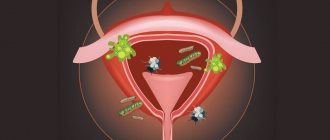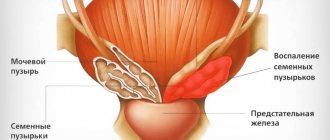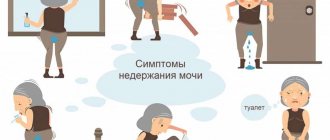Cystitis is a disease accompanied by inflammation of the mucous membrane lining the bladder. Chronic cystitis can occur regardless of gender; cystitis can occur in men and women.
Urethritis is an inflammation of the urethra, which drains urine from the bladder; the mucous layer of cells that line the canal from the inside becomes inflamed.
- Cystitis and urethritis. Causes of the disease
- Why “nothing helps”?
- Diagnosis of chronic cystitis and urethritis
- Chronic cystitis, urethritis. Treatment at the Echinacea Clinic
- Chronic cystitis, chronic urethritis. Symptoms
Cystitis and urethritis. Causes of the disease
Causes. Chronic inflammation of the urinary tract - cystitis and urethritis - is usually caused by an infection that penetrates the bladder or urethra. Most often these are common human companions , for example, E. coli, thrush, and the herpes group virus. These infections can be acquired from the intestines, skin, or sexual contact. Or it could be sexually transmitted infections that were not detected and treated on time. The infection can penetrate from chronic foci of inflammation, which at first glance have nothing to do with the urinary tract: tonsillitis or sinusitis, carious teeth, intestinal or vaginal dysbiosis, furunculosis.
About how to treat and cure the disease “Acute or chronic cystitis” in women and men, exacerbation of chronic cystitis, as well as how to get rid of such a symptom as pain. for cystitis you can read further on this page. We will be happy to help you!
Factors that provoke the appearance of cystitis:
- Stones in the bladder
- Acute and chronic pyelonephritis
- Bladder diverticula with signs of urinary stagnation
- Pregnancy (due to hormonal changes in the woman’s body, the flora in the vagina changes and immune defense decreases)
- Diabetes mellitus, oncology, allergic diseases (cystitis is provoked by taking medications that affect the immune system, altered composition of urine)
- Surgeries and manipulations on the bladder, endoscopic examinations (mucous membranes are injured)
- Menopause (decrease in estrogen causes degenerative processes in the genitals and bladder).
Why “nothing helps”?
Exacerbations (reappearance of symptoms) of chronic cystitis and urethritis are usually associated with the fact that the immune system, which should normally cope with the infection, for some reason cannot do this. Once you help your immune system, the situation will radically change for the better. This is exactly how the treatment of acute and chronic cystitis and urethritis will be structured in our clinic.
Chronic inflammation - cystitis or urethritis - is always an indicator of a weak immune system . You can try treatment with different antibiotics for a long time, but the function of the immune system has not yet been put in order - the slightest hypothermia, sex that is more aggressive than usual, or a new sexual partner with whom the immune system has not yet met, or a flu infection, or an intestinal disorder, dysbacteriosis, dysbiosis in sexual partner - all this can lead to exacerbation. Exacerbation of cystitis is accompanied by pain and requires treatment in both women and men. We will help you get rid of pain from cystitis in both acute and chronic forms.
About how to treat and cure the disease “Acute or chronic cystitis” in women and men, exacerbation of chronic cystitis, as well as how to get rid of such a symptom as pain. for cystitis you can read further on this page. We will be happy to help you!
Possible complications
If blood appears in the urine due to cystitis, consultation with a doctor is required. If a disease that causes loss of blood and much-needed hemoglobin and red blood cells is left untreated for a long time, iron deficiency anemia may develop over time [6].
Self-treatment of the disease is contraindicated, as it is fraught with serious complications:
- an additional infection may occur, progressing to urethritis, glomerulonephritis;
- if antibiotics are selected incorrectly, resistance to them often develops, which will only aggravate subsequent treatment;
- an acute disease can become chronic.
Diagnosis of chronic cystitis and urethritis
The main task of the examination is to find out what is happening with the immune system, why the mucous membranes of the urinary tract cannot cope with the infection. It is also important to evaluate the condition of the bladder and urethra, especially if there are any abnormalities in the structure and development. In such cases, immunity may have nothing to do with it. In addition to consulting a specialist, which will identify the symptoms of acute and chronic cystitis, transferring treatment, especially chronic cystitis, we will need some research.
The examination includes:
- Ultrasound of the bladder (for the diagnosis of cystitis);
- Urinalysis: general urine test, urine culture for flora (to identify the pathogen), PCR for viruses and STDs (chlamydia, mycoplasma, etc.);
- blood test: antibodies to infections, immunogram (the clinic has a special offer for this type of test);
- cystoscopy without exacerbation.
An immunogram and blood test for antibodies to infections are especially relevant when there are other companions to immunodeficiency states: frequent illnesses (ARVI), exacerbations of herpes or thrush several times a year, allergies, chronic tonsillitis, chronic gastritis, dysbacteriosis - usually cystitis or urethritis there is never one.
The immunologist, based on the results of the immunogram, will select a program to help the immune system so that it affects exactly those parts of the immune system that have suffered. There is no cure for the entire immune system; there is a cure for a specific disorder. In each specific case, when a doctor diagnoses chronic cystitis, the results of an immunogram and other tests indicate how to treat it.
About how to treat and cure the disease “Acute or chronic cystitis” in women and men, exacerbation of chronic cystitis, as well as how to get rid of such a symptom as pain. for cystitis you can read further on this page. We will be happy to help you!
Acute and chronic cystitis in children
Various inflammatory processes of the urinary system in children are a mandatory reason to seek qualified medical help. One of the most common pathologies in pediatric urology is cystitis. The disease is manifested by the appearance of an inflammatory process on the mucous membrane lining the inner surface of the bladder. Cystitis of various etiologies is diagnosed in children of any age. In infancy, the disease is equally common between girls and boys. With age, girls become more susceptible to the appearance of clinical signs of bladder inflammation, this is due to the anatomical features of the structure of the genitourinary system. In boys over 5-6 years old, cystitis occurs extremely rarely and is usually a consequence of a descending infection. Depending on the course of the disease, cystitis in children can be chronic or acute. Regardless of the type of disease, it requires timely and effective treatment. Without treatment, cystitis in childhood often causes irreversible consequences in the urinary tract and severe complications in other organs and systems.
Causes
Depending on the mechanism of entry of the inflammatory agent into the lumen of the bladder, cystitis can be caused by the following routes of infection:
- Descending infection. In such cases, cystitis in boys and girls occurs against the background of chronic or acute pyelonephritis, urolithiasis of the kidneys and other pathologies;
- Lymphogenic mechanism. The pathogen enters the target organ through lymph flow from neighboring infected organs;
- Hematogenous route, involving the development of a generalized infection from other organs with bacterial infection. Most often, the cause of cystitis in children with this mechanism is bacterial tonsillitis and adenoiditis;
- Ascending infection. It is this path that is most common in adult girls and women. This is due to the anatomical proximity of the anus and urethra. Most often, cystitis in children is caused by the opportunistic bacterium E.coli, the colonies of which are found in the intestines. If the rules of personal hygiene are not observed, mechanical contamination of the urethra with this pathogen occurs, after which the bacteria enters the bladder and provokes the development of inflammation.
The following factors contribute to the development of cystitis in boys and girls:
- congenital anomalies of internal organs;
- hypothermia;
- the presence of foci of infection in the body of any location;
- decreased protective functions of the body, provoked by certain immunosuppressive conditions;
- failure to comply with personal hygiene rules;
- the need to take various medications;
- unbalanced diet;
- allergic reactions;
- intestinal dysbiosis, thrush, etc.
Signs of cystitis in pediatric patients
Regardless of the mechanism of bladder infection, there are specific signs of cystitis in children, these include:
- painful urination (in infants and young patients this process is accompanied by crying or anxiety;
- increased urge to urinate;
- reduction of a single portion of urine;
- change in its color, transparency, appearance of mucus or blood impurities;
- increase in body temperature to fibril values;
- severe weakness;
- pain of varying nature and intensity, localized in the lower abdomen.
The appearance of even one of the above signs of the disease requires immediate consultation with a pediatrician or pediatric urologist. Only a specialist can make an accurate diagnosis and prescribe effective treatment. Self-medication in such situations risks the development of life-threatening complications and can cause disability in adulthood.
Chronic cystitis, urethritis. Treatment at the Echinacea Clinic
Treatment of chronic cystitis will consist of several steps in one stage, or sequentially:
- We are putting the immune system in order.
- We remove the infection from the urinary tract; often it is the infection that causes the symptoms of chronic cystitis, especially when immunity is reduced.
- We treat all associated sources of infection - for this, our clinic employs the necessary specialists: an allergist-immunologist, a gynecologist, a gastroenterologist, and ENT doctors. This is one of the most important stages in the treatment of chronic cystitis.
- If, during a urological examination, it is discovered that there is something wrong with the bladder itself (polyps, structural defects, prolapse), a urologist can provide the necessary assistance and treatment, and perform minimally invasive surgical treatment.
Result As a rule, after treatment of chronic cystitis, exacerbation of cystitis or urethritis subside within a few days, and immune function is restored within 1-1.5 months.
Monitoring and consolidation of the treatment result After 4-6 months, we look at a repeat blood test, immunogram and those infections that were detected during the initial study - a full analysis for infections is no longer necessary, and this can significantly reduce costs. If necessary, we carry out a course of preventive immune therapy.
We carry out the examination for the 3rd time a year later, again we look at the parameters that were outside the normal limits during the previous examination. The immune system may take time to reorganize and it is important to provide the necessary support until it is fully restored.
About how to treat and cure the disease “Acute or chronic cystitis” in women and men, exacerbation of chronic cystitis, as well as how to get rid of such a symptom as pain. for cystitis you can read further on this page. We will be happy to help you!
Chronic cystitis, chronic urethritis. Symptoms
Unpleasant sensations in the area of the urethra, frequent urge to urinate, it is difficult to endure when you want to go to the toilet, there may be an increase in temperature in episodes at the time of exacerbation of cystitis, or a constant temperature slightly above 37⁰C - if this is a chronic process, there may be a violent exacerbation with a high temperature, admixture of blood in the urine, cloudy urine due to the presence of protein and elements of the mucous membrane that were rejected as a result of inflammation. In severe cases, there may be urinary retention due to swelling of the urethra. There are pains and stings when urinating.
In severe cases, the infection can ascend to the kidneys and cause inflammation of the renal pelvis - pyelonephritis, but this is usually rare
Risk factors
Additional negative factors can provoke the appearance of blood in the urine:
- working or living in places with high concentrations of dyes, chemicals, heavy metals;
- addictions: drinking alcohol, a number of drugs, smoking;
- chronic inflammatory reactions in the body;
- undergoing radiation and chemotherapy;
- weakened immune system;
- problems with the circulatory system;
- endocrinological and hormonal disorders;
- prostatitis in men;
- chronic gynecological inflammation in women [4,5,7,8].







